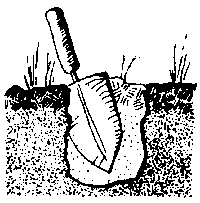Cathole

A cathole or cat hole or sometimes pighole[1] is a pit for human feces. Catholes are frequently used for the purpose of disposing of bowel movements or waste water (such as the water from cleaning the kitchen dishes) by hikers and others engaging in outdoor recreation.
Catholes must be located at a reasonable distance from water sources (rivers, lakes, etc.), to avoid possible bacterial contamination of water via precipitation, as well as away from trails. It is recommended to avoid concentration of catholes around campsites. Filled catholes must be covered with a reasonably thick layer of soil, to prevent access by animals, some of which are coprophagous.
The hiking and camping community consider it essential for catholes to be dug a minimum of 30 metres (98 ft) away from sources of drinking water, and at least 20 metres (66 ft) from any footpath. In practice, a cathole may need to be further away from running water than the minimum recommended distance, especially if it is located uphill from a river or stream, as rain can still cause pollution run-off and consequent contamination.
See also
References
External links
- Sanitation - instructions from Olympic National Park.